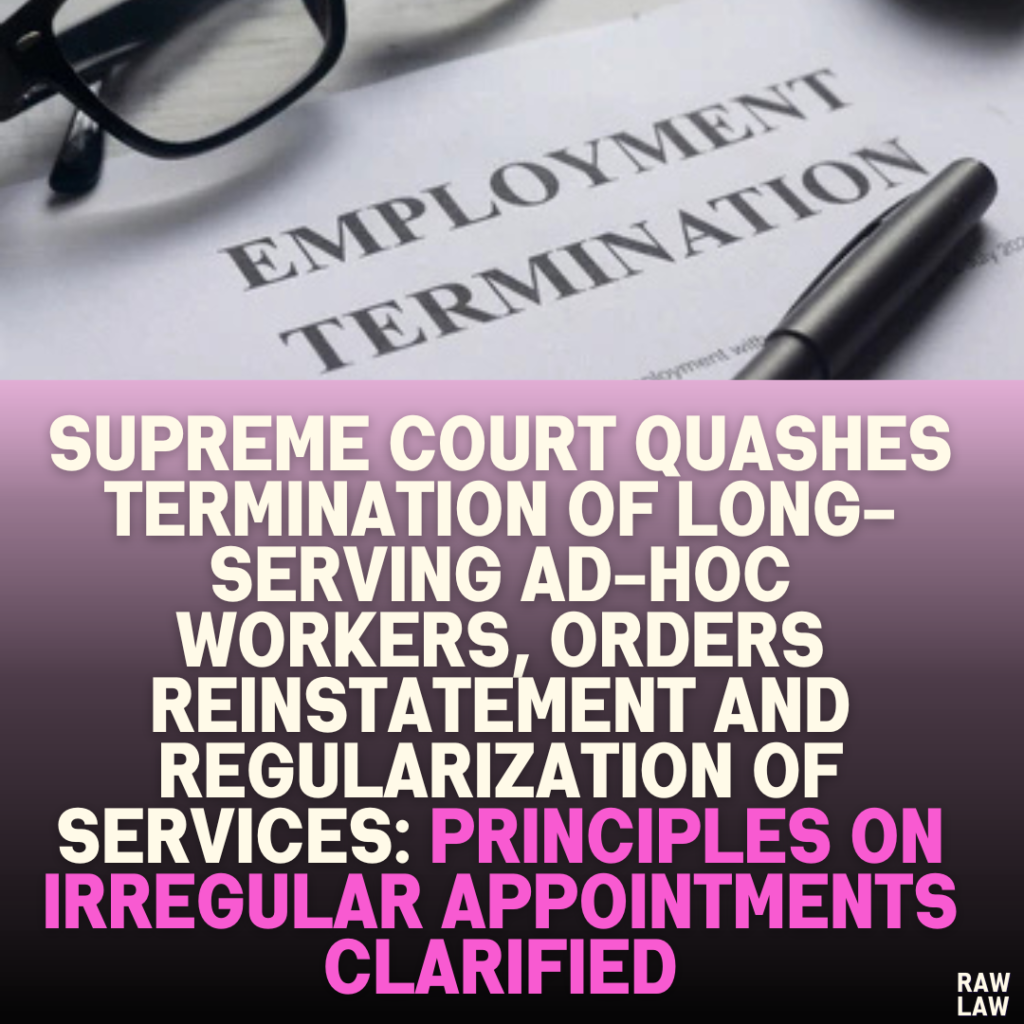Court’s Decision
The Supreme Court set aside the High Court’s and Tribunal’s decisions, granting relief to the appellants. It quashed the termination orders dated 27.10.2018 and directed their reinstatement with immediate effect. The Court also ordered the regularization of their services, recognizing the appellants’ long, consistent, and integral contributions to the functioning of the Central Water Commission (CWC). While back wages for the period they were out of work were denied, the Court provided continuity of service for post-retirement benefits.
Facts
- The appellants were engaged as part-time, ad-hoc workers by the Central Water Commission (CWC).
- Their roles included essential duties such as cleaning, dusting, and gardening, directly contributing to the upkeep and functioning of CWC offices.
- Their service spanned several years, with some appellants serving for over two decades.
- Despite their long tenure and consistent performance, their employment status was never regularized.
- After the Tribunal dismissed their plea for regularization in 2018, the appellants were abruptly terminated without notice, violating natural justice principles.
- The High Court, upon review, upheld the Tribunal’s decision, relying heavily on the principles laid down in Secretary, State of Karnataka v. Uma Devi.
Issues
- Can employees serving in ad-hoc, irregular capacities for extended periods, performing critical roles, claim the right to regularization?
- Does termination without adherence to natural justice principles, such as a show-cause notice, violate the rights of temporary employees?
- Does reliance on outsourcing policies justify denying regularization for long-serving employees?
Petitioner’s Arguments
- Continuous and Long-Term Service: The appellants highlighted their uninterrupted service, emphasizing that their roles were critical and integral to the CWC’s daily operations.
- Nature of Duties: Their responsibilities were not sporadic but involved consistent cleaning, gardening, and maintenance, comparable to regular employees.
- Principle from Uma Devi: They argued that their appointments were irregular but not illegal, thus qualifying for regularization under Uma Devi.
- Equity and Fairness: The appellants underscored the arbitrary nature of their termination, asserting it was unfair given their long and satisfactory service records.
- Discrimination: Cited instances where individuals with less tenure or similar qualifications were regularized, asserting unequal treatment violated Articles 14 and 16 of the Constitution.
- Irrelevance of Educational Qualifications: Argued that their work did not require formal educational qualifications, which were also not mandated at the time of their engagement.
Respondent’s Arguments
- Nature of Engagement: Respondents maintained that the appellants were engaged part-time, on an ad-hoc basis, and were not appointed against sanctioned posts.
- Policy Decisions: Claimed that outsourcing was a legitimate policy decision to improve administrative efficiency and was beyond judicial review.
- Educational Qualifications: Asserted that the appellants lacked minimum educational qualifications for regular appointments.
- Reliance on Uma Devi: Argued that the appellants’ claim was not tenable under Uma Devi, as long service on ad-hoc terms does not automatically create a right to regularization.
- No Vested Right to Regularization: Stressed that no temporary employee acquires a fundamental right to regularization merely through long-term engagement.
Analysis of the Law
The Court delved into the interpretation of Uma Devi, distinguishing between illegal and irregular appointments. It reaffirmed that while Uma Devi intended to prevent backdoor appointments, it recognized the rights of employees in irregular appointments with long, continuous service to seek regularization as a one-time measure.
Precedent Analysis
- Secretary, State of Karnataka v. Uma Devi: The Court reiterated that Uma Devi does not bar regularization of irregular appointees who have served continuously against sanctioned roles for over a decade.
- **Vinod Kumar v. Union of India: ** The Court relied on this judgment to highlight that procedural irregularities cannot deny regularization to long-serving employees performing essential functions akin to regular employees.
Court’s Reasoning
- Nature of Engagement: The Court noted that the appellants’ roles were essential, continuous, and integral to the functioning of the CWC, refuting the respondents’ claim that their engagement was temporary or peripheral.
- Misuse of Temporary Contracts: Highlighted that labeling employees as “temporary” to deny regularization, while continuing to use their services for essential tasks, was arbitrary and exploitative.
- Violation of Natural Justice: The Court condemned the abrupt termination without notice, emphasizing the appellants’ entitlement to fair procedures.
- Outsourcing as a Pretext: The Court viewed the outsourcing policy as a post-facto justification to deny regularization, pointing out that outsourcing did not negate the appellants’ long service.
- Educational Qualifications: Dismissed the argument about educational qualifications, asserting that the appellants’ proven ability to perform their roles for decades outweighed formal requirements.
Conclusion
The Supreme Court allowed the appeal, quashing the termination orders and directing immediate reinstatement and regularization of services. However, the appellants were denied back wages for the period they were out of work but were granted continuity of service for post-retirement benefits.
Implications
- Fair Treatment of Temporary Employees: This judgment underscores the importance of considering long-term service and equity when addressing regularization claims.
- Rejection of Exploitative Practices: The Court’s criticism of temporary contracts and outsourcing practices sends a strong message to public sector employers to prioritize fairness and adherence to legal principles.
- Precedential Value: Reaffirms Uma Devi and sets a benchmark for evaluating regularization claims for long-serving irregular employees in sanctioned roles.
- Policy Impact: Encourages the public sector to adopt equitable employment practices, reducing litigation and fostering job security.
This decision serves as a significant precedent, highlighting the judiciary’s role in addressing systemic issues in public sector employment and ensuring justice for long-serving employees.




Pingback: Delhi High Court Overturns Family Court's Closure of Appellant’s Testimony Rights: ''Balancing Professional Commitments and Judicial Sensitivity in Matrimonial Disputes" - Raw Law
Pingback: Bombay High Court Upholds Acquittal in Cheque Bounce Case: "Presumption Under Section 139 of the Negotiable Instruments Act Rebutted as Complainant Failed to Prove Legally Enforceable Debt" - Raw Law